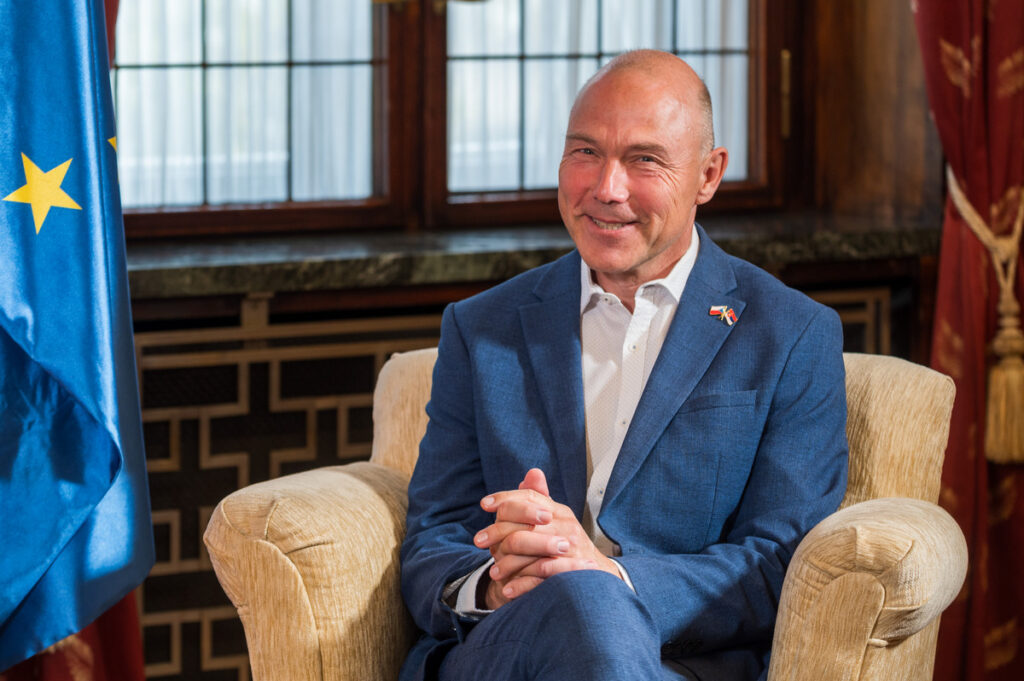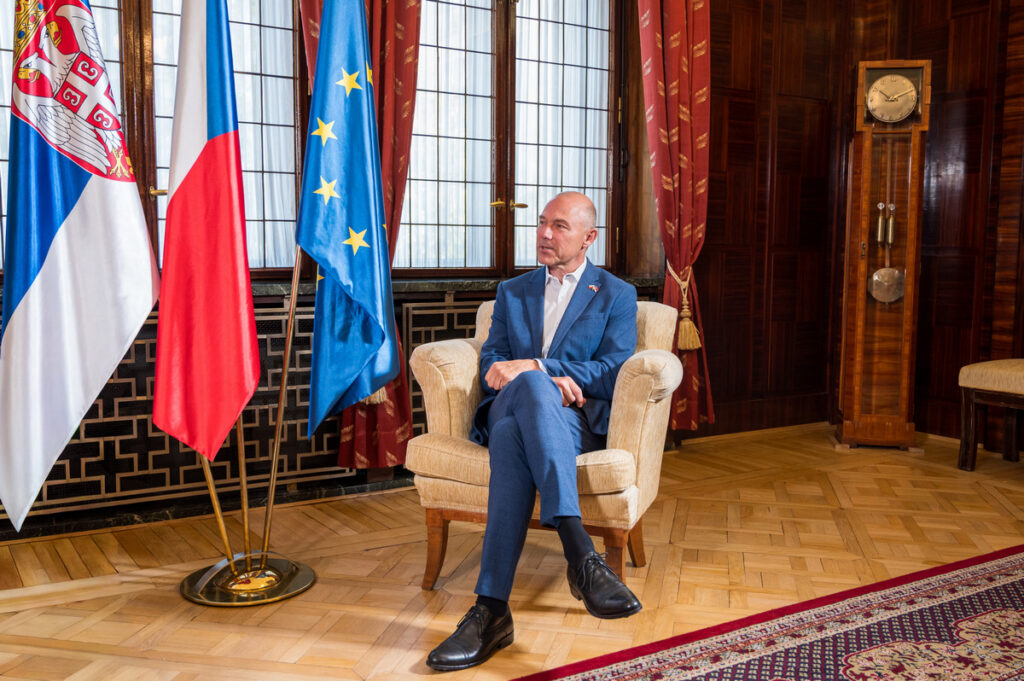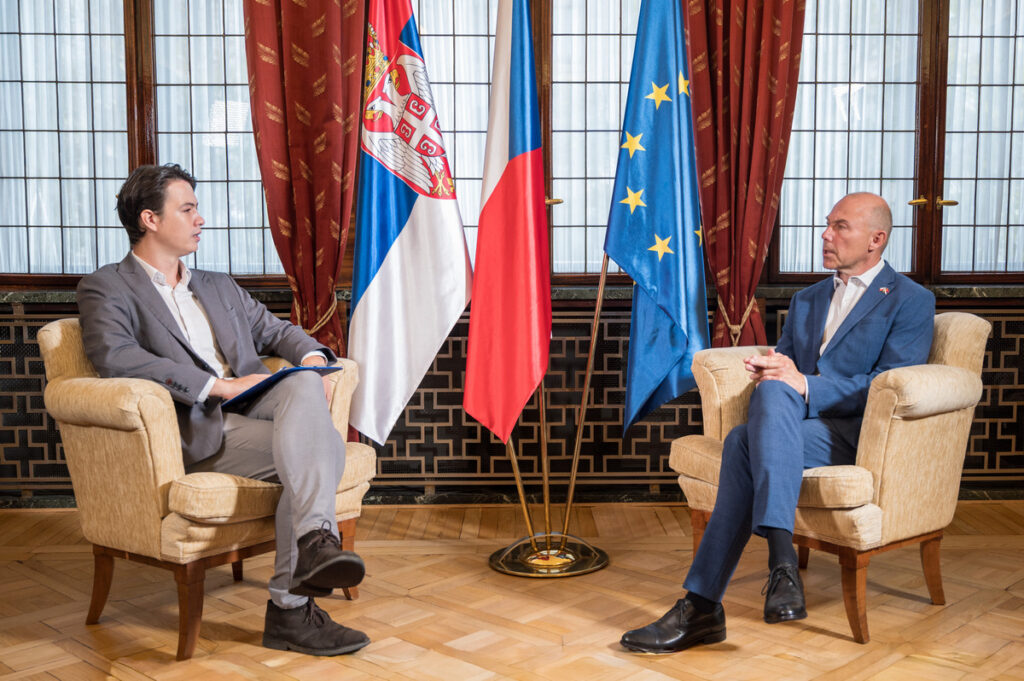A partnership that has evolved over centuries — rooted in understanding and shared values

H.E. Jan Bondy
Ambassador of the Czech Republic to Serbia
The conversation explores the evolving role of the Czech Republic in the Western Balkans — from EU support and civic education to digital partnerships and defence diplomacy. Speaking with us is H.E. Jan Bondy, Ambassador of the Czech Republic to Serbia. The interview was conducted for the TV programme Diplomata, aired on Euronews Serbia.
We were always on the same side of history
You’ve led the Public Diplomacy Department at the Ministry of Foreign Affairs of the Czech Republic multiple times in your career. Could you share with us what core values guide your communication strategies when representing your country abroad, especially in regions such as the Balkans with deep historical ties?
I think that one of the most important roles in our activities as diplomats is also this so-called public diplomacy. It means you care a little bit about your history and the history of the country you’re working for, which also brings our roots closer together. Before I arrived in Serbia, I wondered when we started our relationship with the Serbs and the Czechs, and it came back to the 12th century. So even the Protector Uroš married her daughter to one of the famous Constants from the Znajm, which is a part of the Czech Republic nowadays, Moravia.
We also have Morava, like you do, and it’s an integral part of the country because of the wineries and the very nice landscape. I can recommend it to you. And then, slowly, it developed into a brighter communication. During our, let’s say, famous King Karl IV, there was a strong relationship against the Ottomans at that time, and so on.
So I’m coming slowly, slowly to the point we are now, boosting our relationship like in the 12th and 13th centuries, and we hope it will get closer and closer. So it’s a partnership that evolved over so many centuries. Right, that’s right, and we are never enemies, which is nice to say, nice to mention, and we were always on the same side of history.

You’ve extensively worked in this part of Europe. Could you say that you have a certain affinity for this region, and could you also share with us if any aspects of Balkan diplomacy resonate with your personal or professional values?
My decision was always to work in the south of Europe, with the warm Balkan hospitality and people, because my grandmother and grandfather’s roots are from this part of the world. Because of our, let’s say, strong relationship, I found out that my ambitions and experience could be helpful, and hopefully, it will be true one day. Absolutely. You mentioned the historical ties that the Czech Republic and Serbia share, especially in the Slavic heritage that’s rooted in both countries.
What role do you see Serbia playing in ensuring regional stability in the Balkans? It’s a very important role. You are the centre of the Balkans, and because of your heritage and because of your experience in tackling and working with the neighbouring countries, we feel it is very important.
From my point of view, I think the most important embassy in the Western Balkans is here. You are sitting in the spot nowadays. Even from history, I wanted to mention that the first decision of the young Czechoslovak state in 1918 was to establish diplomatic relations with the Yugoslavian kingdom. Our first president, whom we call Father, President Tomas Garik Masaryk, was a very close friend of the Karadjordjevic, your king at that time. The first building of the embassy was constructed here so that we can celebrate its opening next year.
There is a lot of warmth and a lot of partnership that I have already established
Could you share with us what changes Serbia underwent and the reforms that made this possible? Also, are there any risks that persist in this area?
We are among the 10 biggest investors in Serbia, coming from the Czech Republic. Later, I will mention some companies you know for sure and encounter almost every day with Czech products.
I think it’s important for us to see the country with openness and the ability to accept new models of running companies and making investments, so I think that is very, very important. You have very talented people, similar to the machinery and, let’s say, the technological approach, which somehow attracts our companies. They’re very compatible.
So they are here, and some of them, or let’s say many of them, are already invested here, while others are now searching for what will be possible for the cooperation. And opposite as well, so there are many Serbs who are working in the Czech Republic. They are studying in the Czech Republic, focusing on IT and new technologies, so it’s very interesting to follow them.
On this note, it’s also important to notice the success of the WFS and DunoNet collaboration in digital agriculture. How does the Czech embassy plan to support future tech partnerships in Serbia, as you mentioned, especially in areas like smart farming, forestry, and environmental monitoring?
We are a partner of the fair every year, which is held in Novi Sad and is an agriculture fair, and next year we will participate as well. There were several visits from our Minister of Agriculture. Your last visit by the diplomats and politicians took place in České Budějovice, the biggest Czech fair, last month.
There is a lot of exchange of products, and there is also a significant possibility to boost it. And there is something like the website Agronet you can follow, with a lot of offers and possibilities here. And especially with modern technologies like agricultural drones and field coverage, it’s interesting for future cooperation.

Czechia’s defence industrial cooperation with Serbia is expanding over time, yet public discourse around arms and security is still a very sensitive topic, especially in light of global conflicts. How do you balance these strategic defence partnerships with public interest and transparency in mind?
Unfortunately, we are somehow afraid to discuss the defence, but we see the situation worldwide. We know the necessity of it continuing to rise. There is a necessity, somehow, to improve in this sector as well. So the Czech defence companies are visible to partners. It’s a fair here in Belgrade, which is coming in a few days.
So, I think we will have something like seven companies arriving directly, and some three or four companies that are already on the market. It is not only about the defence itself. It’s about the whole industry of machinery and technology. I will name one of the companies which is known here. It’s “14 Oktobar”, a company which is now in a joint venture with the Czech companies. There are many investments, and it’s not only about the defence sector.
It’s also about the other machinery sectors. So I’m really happy that the company decided to invest the money to hire local people. And so they have more than 200 employers now, which is a reasonable amount. It’s something that will bring us together. I know how sensitive it is for the Serbians. It’s the membership of NATO, for example, but the cooperation since 2006 as a partner in this defence and security system is something I really admire personally.
And there is a lot of cooperation between the militaries of the Czech Republic and Serbia. I think that our last visitors, I mean official visitors from the Ministry of Defence, came two weeks ago. So it’s a communication that is ongoing and evolving.
Could you tell us how you’re liking Belgrade so far? And more generally, what has impressed you here the most, whether it’s culturally, politically, or socially?
I arrived on 1 September last year. And since that time, there have been a lot of things that have happened. First, our Ministry of Foreign Affairs arrived, followed by our Prime Minister, and then our Ministry of Agriculture. I had no chance to see a little bit, to relax yet. And I still hope that I will somehow be able to travel more and see some big cities and interesting parts of the country, as we spoke before, to boost, let’s say, the relationship, which is my task and my role here.
And frankly speaking, I was shocked by the excellence and, let’s say, warmth and openness of the society here in Serbia. So maybe because I’m Czech and because of these roots, this relation, and the Slavic sector, it has helped me a lot. And even I’m still not able to speak properly in Serbish. So there is a lot of warmth and partnership that I have already established.
That’s great to hear. As for the last question, to bring this interview to an end, looking ahead, what kind of legacy would you like your tenure in Serbia to leave, both in terms of bilateral relations and the Czech Republic’s image among Serbian citizens?
I wish to see Serbia among the member states of the European Union. It will be my main goal. And if I can be supportive of this approach, I will do my best.
As a Czech, I would like to open the doors as widely as possible, not only because of the investments, which will come anyway, but also for these roots of partnership. That’s the thing I’m really proud of: seeing a boost in our cooperation in the social sector. We recently opened the Czech house here; it’s something like a culture centre.
And we promote Czech culture, which is well-known here, as well as famous Yugoslavian film directors and singers recognised in the Czech Republic, and so on. So if I am somehow able to make a small contribution in this direction, it will be my real pleasure. I wish you luck in succeeding in this mission.